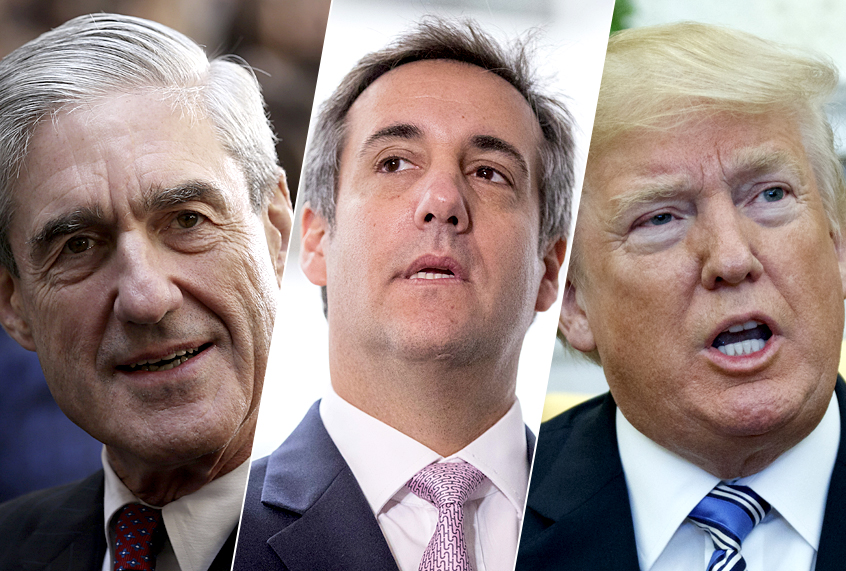There are two huge revelations from a memo and a separate sentencing filing released today by special counsel Robert Mueller and his team that will send tremors through the White House.
First, Mueller’s team disclosed that a Russian national reached out to Trump’s former attorney and fixer Michael Cohen in November 2015, and claimed they could offer the Trump campaign “synergy on a government level.”
Second, federal prosecutors revealed that Cohen paid off two women “in coordination with and at the direction of” then-candidate Donald Trump — described as “Individual 1” — to hide his extramarital affairs.
Mueller and his team are not taking a position on what amount of prison time Cohen should serve, but said “any sentence of incarceration” the court in New York recommends would be “appropriate.”
That’s in contrast to federal prosecutors in New York who noted today that Cohen committed four “separate and serious” crimes over several years — “willful tax evasion, making false statements to a financial institution, illegal campaign contributions, and making false statements to Congress” — and recommended he serve 42 months in prison.
Mueller’s filing notes that Cohen has “gone to significant lengths to assist the Special Counsel’s investigation” and has met with the special counsel’s office on 7 occasions.
- Cohen provided information about his contacts with “Russian interests,” including his and others’ involvement in the Moscow Project and Russians’ outreach to the campaign.
- In November 2015, a Russian national claiming to be a “trusted person” in the Russian Federation reached out and said they could offer the Trump campaign “synergy on a government level.” The person repeatedly offered to set up a meeting between Trump and Vladimir Putin, but Cohen did not follow up on the invitation.
- “By virtue of his regular contact with Company executives during the campaign,” Cohen provided the Special Counsel’s office “useful information concerning certain discrete Russia-related matters core to its investigation.”
- The White House link: Cohen provided “relevant and useful information” about his contacts with “persons connected to the White House” from 2017 to 2018.
You can read for yourself the Mueller Memo on Cohen
The Mueller team revealed that Cohen told them of what seemed to be a previously unknown November 2015 contact from a Russian national, who claimed to be a “trusted person” in the Russian Federation offering the campaign “political synergy” and “synergy on a government level.”
Cohen told investigators the person, who was not identified, repeatedly proposed a meeting between Trump and Russian President Vladimir Putin, saying that such a meeting could have a “phenomenal” impact, “not only in political but in a business dimension as well,” the special counsel’s office wrote.
Cohen, though, did not follow up on the invitation, because he was already working on a Trump project in Moscow through a different person he believed to have Russian government connections, the special counsel’s office wrote.
Cohen had “explained financial aspects of the deal that would have made it highly lucrative,” and, without prompting, he had corrected other statements he made about his contacts with Russian officials during the campaign.
For example, Cohen said in a radio interview in September 2015 that Trump should meet with the president of Russia during the U.N. General Assembly, and claimed for a time the comment had been “spontaneous” and not discussed with members of the campaign. In fact, the special counsel’s office said, Cohen later admitted that he had conferred with Trump about contacting the Russian government for the meeting — which ultimately did not take place.
Prosecutors also, for the first time, described a critical meeting leading up to Cohen’s crime of seeking to buy the silence during the 2016 presidential campaign of two women who alleged they had trysts with Trump.
The memo identifies three people at that meeting: Cohen, “Individual 1,” and “Chairman 1.” The document elsewhere identifies Individual 1 as Trump, and people familiar with the case said Chairman 1 is David Pecker of the National Enquirer.
“In August 2014, Chairman-1 had met with Cohen and Individual-1, and had offered to help deal with negative stories about Individual-1’s relationships with women by identifying such stories so that they could be purchased and ‘killed’,” the prosecutors’ memorandum says.
Cohen has emerged as one of the biggest threats to Trump’s presidency, perhaps leading prosecutors to enough evidence to seek Obstruction of Justice charges.
For his part, Trump responded to the news with a simple tweet:
Totally clears the President. Thank you!
— Donald J. Trump (@realDonaldTrump) December 7, 2018
Robert Mueller’s prosecutors also made clear today his office has gathered evidence that shows Paul Manafort’s interactions with Trump officials.
Prosecutors say Manafort, Trump’s former campaign chairman, made false statements about five major topics.
They include his associate Konstantin Kilimnik, with whom he faced charges for alleged witness tampering; Kilimnik’s role in that alleged crime; and a wire transfer to a company working for Manafort.
Manafort met with prosecutors 12 times and testified twice before a grand jury, the Justice Department said.
During that time, prosecutors say Manafort didn’t tell the truth about key topics even though he had agreed to cooperate with the government in any way it wanted as part of his guilty plea.
Mueller’s office is investigating whether anyone in Trump’s campaign conspired with the Russians who attacked the 2016 election.
Manafort ran that campaign for part of the year and had many contacts with powerful Eastern Europeans as part of his earlier political consulting business.
